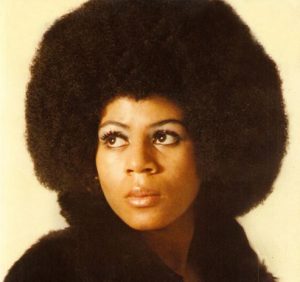 July 12, 1979 – Minnie Riperton was born on November 8th 1947 in Chicago, Illinois. The youngest of eight children in a musical family, she embraced the arts early. As a child she studied music, drama, and dance at Chicago’s Lincoln Center. In her teen years, she sang lead vocals for the Chicago-based girl group, The Gems.
July 12, 1979 – Minnie Riperton was born on November 8th 1947 in Chicago, Illinois. The youngest of eight children in a musical family, she embraced the arts early. As a child she studied music, drama, and dance at Chicago’s Lincoln Center. In her teen years, she sang lead vocals for the Chicago-based girl group, The Gems.
At Chicago’s Lincoln Center, she received operatic vocal training from Marion Jeffery. She practiced breathing and phrasing, with particular emphasis on diction. Jeffery also trained Riperton to use her full range. While studying under Jeffery, she sang operettas and show tunes, in preparation for a career in opera. Jeffery was so convinced of her pupil’s abilities that she strongly pushed her to further study the classics at Chicago’s Junior Lyric Opera. The young Riperton was, however, becoming very interested in soul, rhythm and blues, and rock. After graduating from Hyde Park High School (now Hyde Park Academy High School), she enrolled at Loop College and became a member of Zeta Phi Beta sorority. She dropped out of college to pursue her music career.
While with Chess Records, Minnie sang backup for various artists including Etta James, Fontella Bass, Ramsey Lewis, Bo Diddley, Chuck Berry, and Muddy Waters. She also sang lead for the experimental rock/soul group Rotary Connection, from 1967 to 1971. While still a member of the Connection, Riperton mounted a solo career; teaming with producer/arranger Charles Stepney and her husband/composer Richard Rudolph, she issued her brilliant debut, Come to My Garden, in 1970, but again commercial success eluded her grasp.
After the Rotary Connection dissolved in the wake of 1971’s Hey Love, she and Rudolph took a two-year sabbatical with their two children* in Gainesville, Florida before relocating to Los Angeles, where she sang on Stevie Wonder’s Fulfillingness’ First Finale and toured as a member of his backing unit Wonderlove.
Wonder agreed to co-produce Riperton’s 1974 album, Perfect Angel, which contained the international blockbuster “Lovin’ You.” The record made her a household name, although subsequent LPs like 1975’s Adventures in Paradise and 1977’s Stay in Love failed to repeat its success. By this time, however, commercial woes were the least of Riperton’s concerns.
In 1976 Minnie was diagnosed with breast cancer and underwent a modified radical mastectomy. Though she was given just six months to live, she continued recording and touring, and in 1977 she became spokesperson for the American Cancer Society. In 1978, she received the American Cancer Society’s Courage Award which was presented to her at the White House by President Jimmy Carter.
Riperton continued performing despite her declining condition, and recorded her final album Minnie in early 1979.
On July 12, 1979 she sadly died fighting cancer. She was 31.
Unreleased vocal tracks with new instrumental backing comprised 1980’s posthumous collection Love Lives Forever.
*Actress/Comedienne Maya Rudolph is her daughter.
Uncanny Vocal Abilities
Riperton had a coloratura soprano vocal range. Aside from her various hits, she is perhaps best remembered today for her ability to sing in the whistle register, in which she had rare facility. Riperton’s vocal range spanned five and a half octaves. Riperton’s rare ability to enunciate in the high registers set her apart from most other whistle-register singers. This feature is most notably heard in the song “Here We Go”, where she sings “here we go” in the whistle register. Whistle-register enunciation can also be heard in songs such as “Inside My Love”, “Adventures in Paradise”, “Expecting”, “Only When I’m Dreaming”, and also in “Teach Me How to Fly” and “Like a Rolling Stone” with the Rotary Connection.
Riperton was also noted for her ability to sound almost mechanical or instrumental in the whistle register. In “You Take My Breath Away”, she sang a portamento ending two octaves above the staff. She has also been credited for her ability to sustain notes in the sixth and seventh octave for long periods of time, as in “Reasons”, “Could It Be I’m in Love”, “Adventures in Paradise”, and “Inside My Love”, and also “Love Me Now” with the Rotary Connection.
Having an innate ability to imitate many instruments helped lead to Riperton’s discovery while she was a secretary at Chess Records. In her recordings, Riperton’s highest recorded note reached in the whistle register was F7 on the third scale of “You Take My Breath Away”.Riperton reached this extremely high note before on an early recording of “Teach Me How to Fly” and “Could It Be I’m in Love”. Also in a live performance of the song “Ruby Tuesday” from Rotary Connection, she sang an F#7. In the song “Loving You” she sings a walkdown on the A Major scale from F#6 to A5. She is known as the Queen of the Whistle Register, The Nightingale, and a Songbird. In a 1998 interview for Vibe magazine, Mariah Carey cited Riperton as an influence on her.
Singer Stevie Wonder payed tribute to Riperton during an episode of Soul Train which aired shortly after her death in September 1979. On June 7, 2009, TV One (US TV network’s) Unsung series premièred a one-hour documentary on Riperton’s career and life. It included interviews with her husband Richard, son Marc, daughter Maya, sister Sandra Riperton, and many others who worked with her. Kate Bush named Riperton in the lyric of “Blow Away (For Bill)”, a track on her 1980 album Never for Ever.







